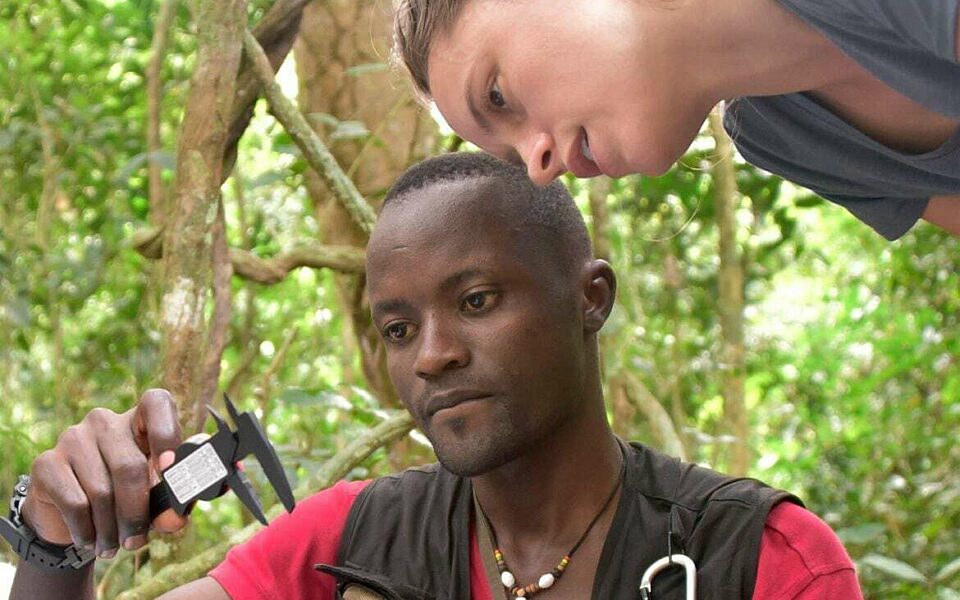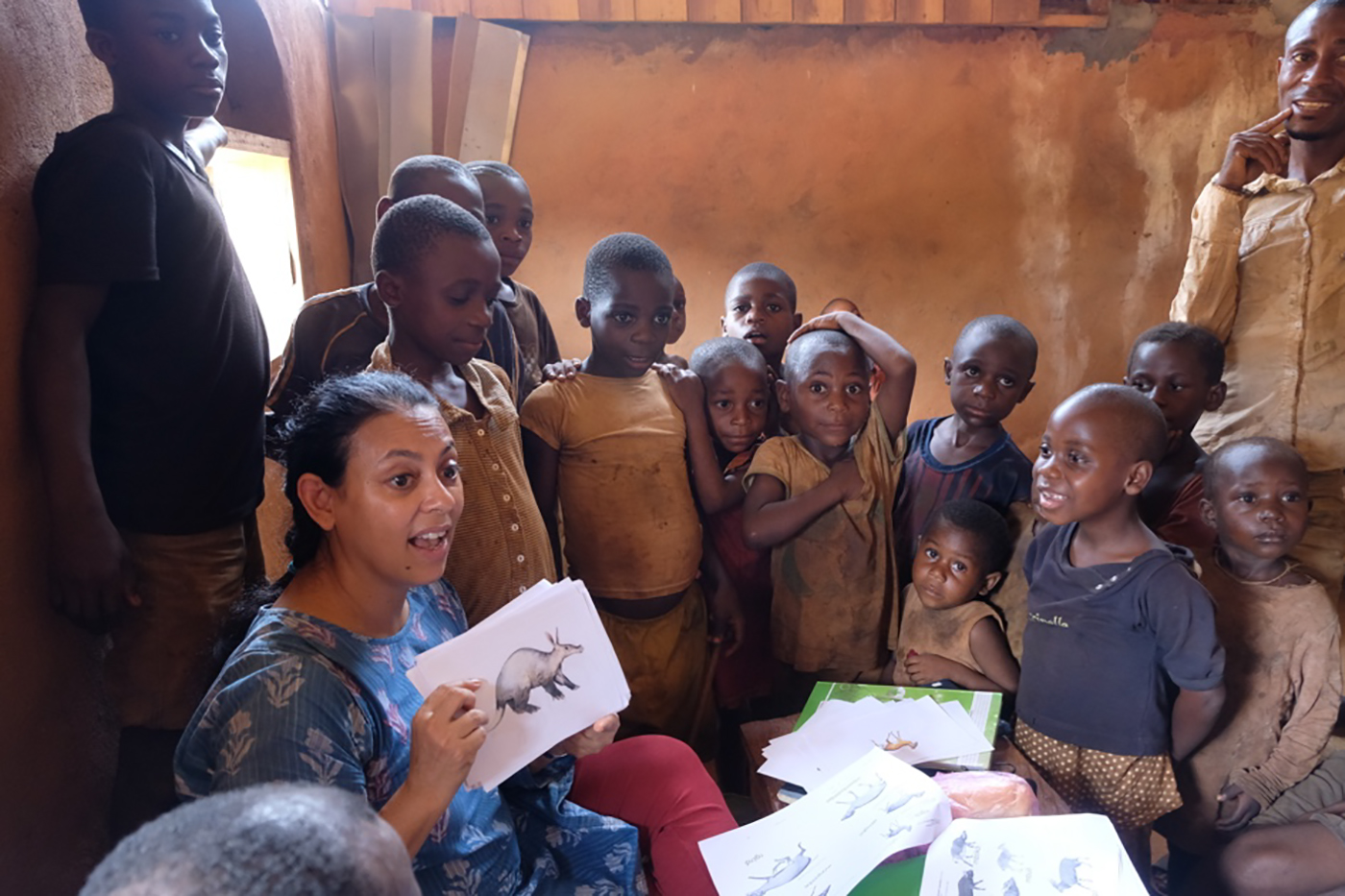
UCLA and Africa: A history of partnership, a future of shared progress
by Taleen Ananian and Mike Fricano at UCLA Newsroom
The impacts have spanned from health care to ecological preservation
On days when Romeo Kamta has to go to his off-campus research station, it doesn’t mean getting in his car and hitting the Southern California freeways. Instead, it means hiking about 20 miles through dense rainforest to reach the Bouamir Research Station, which is only accessible by foot. Kamta is the camp manager of the Congo Basin Institute, UCLA’s first international affiliate that was formed in 2015 with in-country partner International Institute of Tropical Agriculture. Kamta is based full time in Cameroon, where he is rising young scientist.
As a public university filled with people dedicated to making a positive impact, UCLA has people like Kamta living and working in sub-Saharan Africa, partnering with higher education and nonprofit leaders, community members, the private sector, physicians, scientists, students and researchers to help them develop treatments and solutions to complex issues like malnutrition and environmental sustainability.
UCLA Chancellor Gene Block; Cindy Fan, vice provost for international studies and global engagement; Patricia Turner, senior dean and vice provost of undergraduate education; Charles Alexander, associate vice provost for student diversity and director of the Academic Advancement Program; and several other UCLA administrators and faculty, are in Africa from Jan. 27 through Jan. 30 learning more about the field work being done in sub-Saharan Africa, which includes projects in Cameroon, Malawi and Mozambique.
They also joined a UCLA delegation that included Abel Valenzuela, director of the UCLA Institute for Research on Labor and Employment and professor of Chicana and Chicano studies, at the Diversity in Higher Education Colloquium in Bloemfontein, South Africa, an annual interdisciplinary conference co-hosted by the University of the Free State in South Africa, Vrije Universiteit Amsterdam and UCLA. The tripartite collaboration established in 2014 aims to promote diversity and equity in higher education institutions across the globe through research, teaching and collaboration. This year’s conference, attended by about 70 people from five countries, focused on the ways many students, staff and faculty confront fragility and resilience in their daily discourse and interactions, and through media, politics and more.
“UCLA’s partnerships in sub-Saharan Africa have been incredibly successful in helping tackle regional issues to improve quality of life,” Block said. “As a public research university, it is important for UCLA to both share our expertise as well as learn from and collaborate with colleagues around the world for the advancement of society.”
A large part of what has made these partnerships successful is UCLA employees who have dedicated themselves to working in Africa full time. Here UCLA spotlights a few of them:
Chris Buck supports pediatric, surgery and family medicine residency training programs throughout Mozambique, as director of the UCLA-Mozambique Academic Partnership, which is part of UCLA’s Global Health Program. Buck, who is an assistant professor of pediatrics, also oversees the David Geffen School of Medicine at UCLA’s Partners for Pediatric Progress program in Mozambique, which started in 2008. At that time, there were 10 pediatricians and no pediatric surgeons in a country with more than 10 million children. Working closely with the country’s main medical school, the Eduardo Mondlane School of Medicine, and its adjacent teaching hospital, that number grew to 90 pediatricians as of 2019.
Dvora Joseph Davey, assistant professor in epidemiology in the Fielding School of Public Health, works full time in Capetown, South Africa, where she is principal investigator in a study looking at the effectiveness of integrating a HIV-prevention drug, pre-exposure prophylaxis (PrEP), in antenatal care for pregnant and breastfeeding women at risk of HIV. The study is part of an NIH-funded Fogarty International Research Science Development Award and NIMH R01 award. She is also an honorary senior lecturer in epidemiology at the University of Cape Town. Davey is one of more than 10 UCLA researchers and students conducting health research in South Africa.
Romeo Kamta is the camp manager of UCLA’s Congo Basin Institute, which launched in Cameroon in June 2015. A partnership with the International Institute of Tropical Agriculture, the institute functions as a one-of-a-kind center to address the challenges of food and water security, climate change, biodiversity loss, public health and emerging diseases. UCLA biologist Tom Smith is co-director of the institute, while Matthew LeBreton oversees day-to-day operations in Cameroon, providing researchers an opportunity to study and test solutions to address deforestation, mining, fast-growing urbanization, poverty, poaching, lack of sanitation and clean water, infectious diseases and more. Embodying the idea that “Africans are the greatest change agents for Africa,” the institute seeks to end what has too often been a brain drain of African scientists relocating to more developed economies.

Dr. Sundeep Gupta is the programs director for Partners in Hope, Malawi. In this role, Gupta oversees all UCLA and Partners in Hope public health program and research grants in Malawi, while also serving as the in-country focal point for all UCLA medical students and residents conducting clinical and science rotations. Gupta is also an assistant professor in the division of infectious diseases in the medical school and a part of the UCLA Global Health Program, which is led by director Dr. Risa Hoffman.
People from UCLA have collaborated with many others in countries throughout Africa to help make impacts in fields spanning health care to the arts to of course, scholarship.
Anne Rimoin, professor of epidemiology in the UCLA Fielding School of Public Health, has conducted research in the Democratic Republic of Congo for the past 18 years and her work has yielded several findings, including the emergence of monkeypox since the cessation of smallpox vaccination and the identification of new pathogens in animals and humans. In 2004, when Rimoin joined UCLA, she founded the UCLA-DRC Health Research and Training Program. The program provides training opportunities for U.S. and Congolese epidemiologists to conduct infectious disease research in low-resource, logistically complex settings. The Fielding School has a full-time research and training team, led by Rimoin, in the DRC that has been active for more than a decade. Rimoin also serves as director of the Fielding School’s Center for Global and Immigrant Health.
►UCLA team helps create facility for Ugandan women who suffered childbirth injuries
Dr. Thomas Coates, founding director of the UCLA Center for World Health, which is now the UCLA Global Health Program, has directed community-randomized clinical trials in South Africa, Zimbabwe, Tanzania and Thailand to determine the impact of strategies for destigmatizing HIV community-wide, as well as led a prevention clinical trial in South America as part of a five-country effort. Coates, who is the Michael and Sue Steinberg Endowed Professor of Global AIDS Research within the infectious diseases division, serves as director of the University of California Global Health Institute.
David Gere, founding director of the UCLA Art & Global Health Center and professor of world arts and cultures/dance in the UCLA School of the Arts and Architecture, teaches courses in arts activism. Gere spearheaded the Through Positive Eyes initiative at the International AIDS Conference in Durban, South Africa.
Founded in 1959, the UCLA African Studies Center, which is part of the UCLA International Institute, engages a global network of students, scholars, educators, policy makers, entrepreneurs, artists and activists committed to research that makes an impact. The center, which enjoys an excellent reputation in Africa, strives to promote change based on collaboration with African partners, international colleagues and organizations.
The center’s current initiatives — “Africa’s Readiness for Climate Change Forum” and “Refugee Worlds, Refugee Lives”— involve African educational, nonprofit, government and private sector partners. The ARCC Forum will convene at UCLA in April 2020 to elaborate on a collaborative “green development” agenda for the continent, including a five-year action plan. The forum will engage many Africans doing cutting-edge work in sustainable energy and development. The refugee initiative seeks to rethink the contemporary refugee crisis in Africa by approaching refugee camps as communities with the potential to solve the very problems they represent.
Future projects will focus how cultural beliefs affect the use of modern health care services in Malawi and the shrines, rituals, deities and dungeons associated with the slave forts that were sites of monumental human commodification during the Atlantic slave trade.
Students have also been involved. The six members of the 2019-2020 Sustainable Ebony Practicum Team are raising money via UCLA Spark so they can travel to Africa to work with Cameroonian locals on ebony production that is environmentally sustainable and helpful for local economies. This project is a collaboration among Taylor Guitars, Cameroonian locals and the Congo Basin Institute.